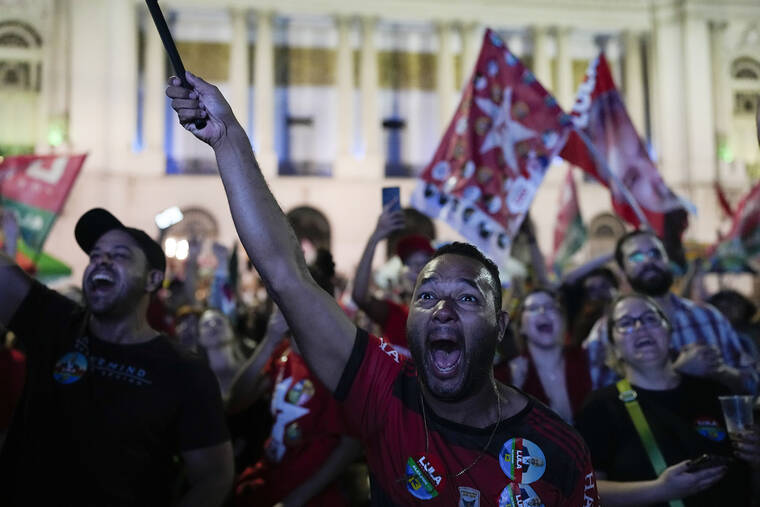Bolsonaro, Lula start fight for support before Brazil runoff
RIO DE JANEIRO — Jair Bolsonaro and Luiz Inácio Lula da Silva, two diametrically opposed candidates for Brazil’s presidency, have started a four-week race to pursue votes ahead of a winner-take-all runoff.
After garnering more than 90% of the vote in Sunday’s first round, leaving their competitors far behind, incumbent President Bolsonaro and ex-President da Silva are already eyeing options that can push them over the top, whether political alliances or endorsements from candidates now eliminated.
ADVERTISING
Political analysts say Bolsonaro will seek to capitalize on an unexpectedly strong showing by the right wing as a whole to shore up support from politicians seeking advantageous alliances while da Silva — who won the first-round vote — reaches out to moderates.
The election will determine whether a leftist returns to the helm of the world’s fourth-largest democracy or whether Bolsonaro can advance his far-right agenda for another term.
Many polls had indicated leftist da Silva had a significant lead, with some suggesting he could even clinch a first-round victory. Most showed margins that neared or exceeded double digits. But Bolsonaro came within just five points of da Silva, forcing an Oct. 30 runoff.
While da Silva’s tally of 48.4% of the vote was within most polls’ margins of error, Bolsonaro’s 43.2% far exceeded most of them. The president’s allies running for Congress and governorships also outperformed polls.
“The far-right has shown great resilience in the presidential and in the state races,” said Carlos Melo, a political science professor at Insper University in Sao Paulo.
Speaking after the results, da Silva said he was excited to have a few more weeks of campaigning and the opportunity to go face-to-face with Bolsonaro and “make comparisons between the Brazil he built with the Brazil we built during our administrations.”
“I always thought that we were going to win these elections. And I tell you that we are going to win this election. This, for us, is just an extension,” da Silva said.
Meanwhile, Bolsonaro seemed to appeal to poorer voters, who make up a significant chunk of da Silva’s base. He highlighted high inflation that has boosted the cost of food and has hurt the approval ratings of leaders worldwide.
“I understand there is a desire from the population for change, but some changes can be for the worse” he said. Bolsonaro added that he wanted to keep Brazil from adopting leftist economic policies that would put it on a troubled economic path similar to those of Argentina and Venezuela.
It still isn’t clear why polls missed the mark on support for Bolsonaro and right-wing candidates.
Some analysts suggest voters had been embarrassed to tell pollsters they backed Bolsonaro and instead listed another candidate, said Arilton Freres, director of Curitiba-based Instituto Opinião. “But that in itself doesn’t explain everything,” he added, saying outdated census data also may have had an impact on the design of the polls.
Bolsonaro and allies have repeatedly cast doubt on the polls, and pointed instead great turnouts at his street rallies. “Many people were carried away by the lies propagated by the research institutes,” Bolsonaro wrote Monday on his Twitter profile.
The right’s positive night extended to races for congressional seats and governorships, especially candidates with Bolsonaro’s blessing.
Bolsonaro said his party’s showing could bring fresh endorsements ahead of the runoff as other parties strike alliances in exchange for support.
Bolsonaro’s Liberal Party will surpass da Silva’s Workers’ Party to become the biggest in the Senate and the Lower House, with a total of 112 seats, or 23 more than its main rival — though still are short of what is needed to pass legislation by itself.
The right’s stronger-than-expected showing in Brazil’s populous southeast especially could benefit Bolsonaro, analysts say. His former infrastructure minister topped the race to govern Sao Paulo and will go to a runoff.
The governor of Rio de Janeiro, an ally, won reelection outright, and the governor of the second most populous state, Minas Gerais, indicated he will endorse Bolsonaro in a video message Monday afternoon.


